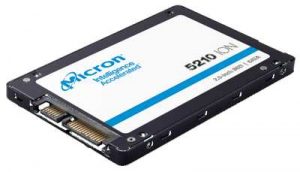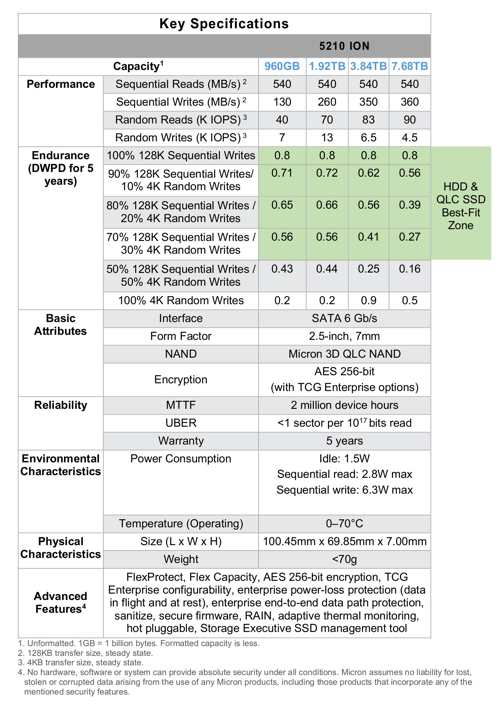Micron: 5210 ION Enterprise SATA 2.5-Inch Up to 7.7TB SSD With QLC NAND
Up to 540MB/s and 360MB/s sequential RW speeds, 90,000/4.500 IO/s random RW for 7.7TB model
This is a Press Release edited by StorageNewsletter.com on April 13, 2020 at 2:10 pmMicron Technology, Inc. announced the 5210 ION enterprise SATA SSD capacity and features, solidifying its QLC technology volume production.
First QLC SSD, the 5210 is based on the company’s QLC NAND technology and replacing legacy HDDs.
From SQL and NoSQL databases to big data and analytics, object stores and vSAN capacity tiers, customers are now reaping the benefits of NAND flash on performance-sensitive workloads that used to live on HDDs. Rapidly supplanting 10,000rpm HDDs, the 5210 SSD delivers 175x faster random reads, 30x faster random writes, 2x more sequential throughput, and 3x more energy efficiency than the largest 10,000rpm HDDs (1) – at a compelling price point.
“The robust adoption of the Micron 5210 SSD since launching two years ago is indicative of the rise of QLC technology in the data center,” said Roger Peene, VP marketing, storage business unit, Micron. “We are proud of the role we have played in driving adoption of the emerging QLC data center category, providing customers with benefits ranging from more speed and lower latencies to significant power savings and competitive economics.“
OEM adoption momentum is accelerating the industry’s transition from HDDs to QLC SSDs in general-purpose server workloads, improving their performance, reliability and power consumption.
“The new and innovative QLC wear-optimization technology engineered into Micron’s SSDs can enable customers to safely leverage SSDs for many of their workloads, addressing an important customer need as performance and capacity demands grow,” said John Donovan, executive director, data center infrastructure, Lenovo Data Center Group. “Micron’s 5210 QLC SSDs are available today on Lenovo’s ThinkSystem solution portfolio.“
As workloads evolve to meet growing demands for real-time data insights and analytics, data centers increasingly need the steady-state speed, capacity, efficiency and reliability that enterprise flash storage can provide but HDDs cannot. High-density QLC NAND flash media achieves densities of 1Tb on a single chip, providing the ease and platform continuity of SATA, but with the value and speed of QLC NAND. The 5210 ION SSD is optimized to meet these demands, delivering more compelling economics for enterprise storage compared with HDDs.
5210 product developments:
-
QLC firmware innovations – The firm’s latest QLC custom firmware helps remove QLC endurance concerns and workload limitations, enabling QLC SSDs to reliably replace HDDs in general-purpose servers and storage.
-
960GB SKU – The company’s 960GB SKU (available) satisfies customer demand to replace 900GB to 1.2TB 10,000rpm HDDs with cost-competitive SATA QLC SSDs.
-
OEM qualifications – The 5210 ION SSD is qualified by most major server OEMs, providing end customers numerous supply chain options and confidence that the 5210 has been stringently tested.
-
VMware vSAN-certified – It is certified on VMware vSAN and one of a most cost-effective ways to move to all-flash vSAN.
The 5210 ION SSD is in mass production and available through nearly all major server OEMs, global distributors, resellers and system builders, with unit prices comparable to those of 10,000rpm enterprise HDDs.
Resources:
Getting business intelligence in SQL databases in less than an 1 hour vs. 8 hours on HDDs
Getting 7x more operations per second on NoSQL databases compared to HDDs
Saving 2 hours performing Sort in Hadoop and running TeraGen 40% faster than HDDs
Achieving 8x faster machine learning with the 5210, as measured by Colfax Research
Enabling massive data analytics with Apache Hadoop and Spark, when using 5210 HDFS storage with NVMe YARN cache
(1) Based on public data sheet values for the 1.92TB Micron 5210 SSD (70,000 IO/s) and SNIA PTSe IOPS industry-standard test results or 2.4TB 10,000rpm hybrid HDDs (rounded up to 400 IO/s). Actual performance may vary. Energy-efficiency comparison based on data sheet values for active average reads.

















 Subscribe to our free daily newsletter
Subscribe to our free daily newsletter


